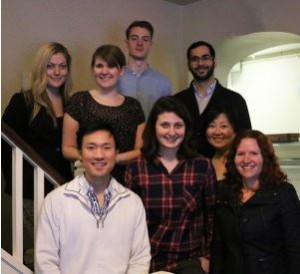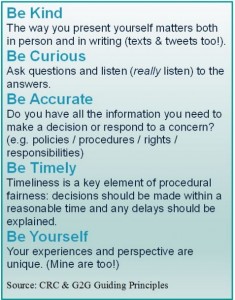Tuesday, March 1st, 2016...2:44 pm
Student-Supervisor Relationships and What to Do in Times of Conflict
Guest post: Natalie Pankova, G2G Peer Advisor, Conflict Resolution Centre for Graduate Students
Though complex in nature, the grad student-supervisor relationship is extremely important to the success of students during their graduate career… this means it is definitely worth investing extra time and care in developing and nurturing it!
In recent years, many Canada-based studies have shown that not only is a good student-supervisor relationship essential to individual success, but the tensions that might result from these relationships can put even more stress and worry onto a student during an already difficult period.
I’m sure most grad students can agree that the relationship is analogous to something between an arranged marriage and a tightly-woven student-teacher interaction, often lasting upwards of 6 or 7 years. Fortunate enough to have a great supervisor myself, I have never-the-less witnessed many of my peers suffering through tough situations arising from poorly managed relationships, and if this relationship is a key element of our success, then we have to ask:
What is the seemingly elusive key to a great student-supervisor relationship?
Looking at my own graduate education, and having spoken to a number of peers during their graduate careers, it seems this boils down to this:
- Having mutual goals
- Having a mutual understanding of those goals before starting the graduate work
Therefore, if I can offer one piece of advice to other graduate students it would be this – find out what your supervisor’s goals and interests are; what are they trying to achieve in the near future? Perhaps it’s one of the following:
- Tenure
- Publications
- Commercializing a product
- Obtaining a large grant
- Developing a course
And any of these may have a large impact on how your graduate career turns out. Unfortunately, many students start their studies without having done the adequate research. Which is paradoxical considering how much research they will often have to do during the course of their degrees. It’s a wonder to think that a lot of students start this big step following only a 20 minute conversation with a potential supervisor – the person they plan to work very closely with, potentially for the next five years or so. To achieve the best possible relationship from the beginning may require to go beyond the one-time meeting. Ask a potential supervisor for a coffee and see if you actually enjoy having a conversation with this person. If you went on a week-long international conference with only them to hang out with, would you be able to do it? Building a relationship with them allows you to get a better idea of what it would be like to work side by side. And remember, your supervisor is a person too, and they too want a great working relationship with you.
Since most of us are beyond the point of choosing our supervisor from scratch, and in a situation where the relationship has already been cemented over a few years, consider doing the same thing whenever you feel that the relationship is hitting hard waters and conflict may be on the horizon:
- Adopt their perspective and think about what your supervisor wants in the near future
- Think about what their goals may be
Likely it’s the same thing as you – to complete the work, publish, and have you graduate. Use this perspective and goal alignment to come to mutual agreements when issues arise. Seeing things from another person’s standpoint is a proven conflict resolution and leadership tactic. Good leaders know that doing this can get the best results in the workplace. Students often perceive their interests as being the most important – after all they are paying for an education, and the ability to do research, publish and graduate. The majority of students don’t consider the interests of their supervisor or what they are trying to accomplish. On top of that, students may never consider that they may have to work at managing this relationship, placing the entire burden of authority on the supervisor. Often times, supervisors are individuals who have never spent a day outside the academic circle, and don’t have much experience managing a diverse group of people. Students should be conscious of this and consider that they also have a responsibility for the outcome of their graduate education. Taking on the supervisor’s perspective is a good first step to building or repairing this relationship. And keep these points in mind:
- This route of action may lead to compromising to an extent at times
- Compromise is a part of any relationship
The key is being able to compromise without sacrificing things that are vital to you. So if conflict in the relationship arises, think about where you would be willing to compromise to come to an agreement.
Overall, setting expectations as early as possible in the relationship can prevent conflict arising down the road. If the relationship is well in its course, having this conversation when an issue has arisen may also be beneficial. That way expectations for the remainder of the study period can be clarified. And if you’re a grad student and you’re really struggling with conflict during your graduate studies, consider stopping by for a chat with a grad-to-grad peer conflict resolution advisor. http://gradcrc.utoronto.ca/
Natalie P.
G2G Peer Advisor, Conflict Resolution Centre for Graduate Students




Leave a Reply